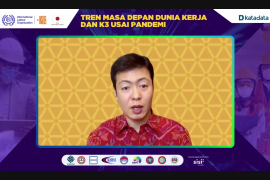"First of all, they are invisible in our minds because often, we do not see or appreciate the values and contributions made by domestic workers," Miyamoto noted during the launch of a book titled We Will Not Be Silent: 31 Stories of Domestic Workers behind the Domestic Walls in Wisma ANTARAs Adhyana Auditorium in Jakarta on Thursday.
Secondly, she believed that the term pembantu, which is Bahasa Indonesia for helpers, distorts the fact that they are workers, much like those who work in professional fields.
"We call them our helpers, even if what they are doing is actual work, just like you, me, and everyone else," she pointed out.
Miyamoto further elaborated that another factor that may add to the invisibility of domestic workers is the fact that they work inside private households.
"Since they work in private houses, it becomes difficult to identify any kind of abuse that may happen," she stated.
However, she continued that the development of social media and online network have made the sharing of information so much easier throughout the country, so that domestic workers can actually have their platform to voice the aspirations and even report any maltreatment they might experience.
"Information can be shared through social media platforms. Hence, it is very difficult to conceal information these days," she reiterated.
The launch of the book, which consists of 31 stories written by 27 domestic workers who aspire to change the perception and stigma against domestic workers, is as an effort to document the lives of Indonesian domestic workers and their struggle to be recognized as workers.
It is the result of the cooperation between the ILO, JALA PRT, and the Jakartas Independent Journalist Alliance (AJI Jakarta).
Meanwhile, Director General of Manpower Placement Development and Expansion of Employment Opportunities from the Indonesian Ministry of Manpower, Maruli A. Hasoloan, remarked that the Ministry fully supports the achievement of basic rights of domestic workers, which is done through the Ministerial Regulation number 2 of 2015.
"We have formulated a regulation, which is the Ministerial Regulation number 2 of 2015, to support the achievement of domestic workers basic rights, which include work insurances and minimum age for work; although it is yet to be perfect, we are gradually aiming towards the ILOs convention number 189," he remarked. (*)
Editor: Heru Purwanto
Copyright © ANTARA 2017









